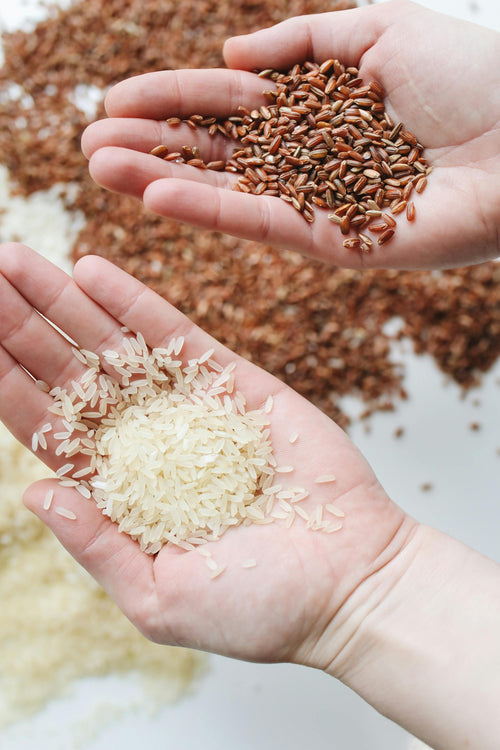Everyone has a say on the “right” way to manage their diet. However, we are all different: by our ages, our sizes, our weights, our places of life, our lifestyles, our customs... Why should there be only one way of eating, with universal codes?
It is therefore very complicated to navigate, a person's diet often changes throughout their life, and that's a good thing, there is nothing beneficial about monotony in a diet. The most important thing is to be in tune with it and avoid harmful eating behaviors as much as possible.
We give you a few missteps to avoid repeating to start the year on a good footing:
#1 – Say goodbye to weight loss diets
It doesn't matter what last miracle method you heard about: it won't work long-term, won't be healthy and may even be dangerous.
The principle of weight loss diets is almost always the same. They are based on a low-calorie diet and the avoidance of one or more categories of foods deemed incompatible with weight loss. These two points are easy to invalidate:
- A low-calorie diet over a given period of time will never guarantee lasting weight loss. Indeed, undereating yourself during a diet will surely cause you to lose a few pounds, but it is impossible to undereat yourself in relation to your real needs over a lifetime. So once we return to a normal diet in terms of calories, there is the inevitable “yo-yo effect”, with the regaining of the lost pounds, or even more! For lasting weight loss, it must be done gently, so that the body adapts little by little to these new dietary changes which should not be drastic, so as not to put it in a state of withdrawal.
- Avoiding one or more categories of food, in addition to being totally useless because our body needs each of them, can be really harmful for the body. This induces an imbalance in the intake of macronutrients, which we greatly need for the balance of our physiological functions. Micronutrient deficiencies are also to be expected. All of these factors can have physical and psychological consequences on health, and even lead to more serious pathologies.
ANSES has also largely recommended against the practice of weight-loss diets, citing some of them in one of its files. If you want to start losing weight, it is best to contact a dietitian.
#2 – Limit or eliminate starchy foods and bread
For many people, starchy foods and bread should be limited. However, they represent the main contribution of carbohydrates, an essential macronutrient since it is supposed to represent 40 to 55% of the daily nutritional intake. What's more, these are complex carbohydrates, which do not negatively impact blood sugar levels, unlike simple carbohydrates.
Used as a substrate in many metabolic pathways, they also allow you to feel full throughout the day, and therefore not to indulge in less essential foods.
#3 – Use any fat for cooking
Fats react to heat! Oils have different fatty acids, also in different contents, which means that they do not all exhibit the same behavior when exposed to heat. For each oil, we have identified a smoke point, that is to say a temperature beyond which the fatty acid composition will be modified (very often into harmful fatty acids). For cooking, the most suitable oil due to its lipid profile and smoke point is rapeseed oil!
#4 – Only drink once thirst sets in
Most people only drink during meals and when they are thirsty. However, when we are thirsty, it is because the state of dehydration has already started. Water is essential, it facilitates digestion, allows the transport of essential compounds in the body, helps maintain an adequate body temperature and promotes the elimination of toxins. So we make it a point to drink the recommended 1.5 to 2 L of water per day; the trick is to drink a 1 L bottle between each meal, to keep close to you, clearly visible on your desk for example. It is best to drink between meals, as water ingested during meals dilutes digestive juices and will trigger satiety more quickly than it should, which can create cravings between meals.
#5 – Sacrifice pleasure
Eating is vital, but it’s also a pleasure! If we have taste buds, it's not for nothing. A healthy diet is a balanced diet, but also a diet that leaves no room for frustration. If there is, it means you are in an eating pattern that is not sustainable. It may take time, but the most important thing is to find a balance between healthy and fun. Little by little, we often get a taste for it and then the two go hand in hand!
#6 – Neglecting probiotics!
To get the winter off to a good start, we can only recommend a course of probiotics. Due to our lifestyles, our intestinal microbiota is put to the test. Stress, industrial food, tobacco, alcohol, etc. All these factors deteriorate our intestinal flora. The essential probiotics contains 8 strains of bacteria and 28 billion CFU which will strengthen your microbiota, an essential action as you enter winter, in order to stimulate your immune system and get rid of digestive disorders.
Probiotic supplementation does not allow lasting colonization of the intestinal flora, which is why it is recommended to renew your treatment at each change of season.
Sources:
[1] Weight loss diets | ANSES - National Agency for Food, Environmental and Occupational Health Safety. (2019). Accessed December 28, 2021, at https://www.anses.fr/fr/content/r%C3%A9gimes-amaigrissants



















